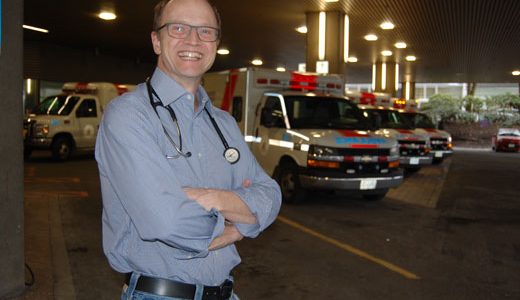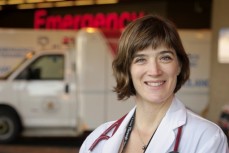Quality research in the ED? Yes, really.
The fast-paced, high-pressure environment of the Emergency Department (ED) may not appear conducive to research. But take a closer look, says Dr. Jeff Brubacher.
“The VGH Department of Emergency Medicine has a tradition of producing high-quality original research,” says the department’s Research Director. “We also collaborate on research initiatives led by other departments and external groups.”
One of BC’s busiest, the VGH ED sees the most acute patients of any hospital in the province. Still, in the blur of 24/7 activity, ED physicians and staff are conducting research that’s improving the health and health care of people at VGH and across BC and Canada.
Advancing public health and health care
From smoking cessation to diabetes prevention to road safety, the research is often — but not exclusively — designed to learn how people can avoid Emergency Rooms (ERs) and hospitals altogether.
Dr. Brubacher’s research focuses on road safety, with a special interest in drug-impaired driving. Past research on alcohol-impaired driving resulted in stiffer laws — legislation that further research showed to reduce traumatic injuries due to drinking and driving. Today, Dr. Brubacher is principal investigator on a five-year study investigating the role of cannabis in causing motor vehicle crashes.
“Research pursued in the ED can impact public policy or it can change the way we care for the next patient who comes through our doors, he says.
Dr. Corinne Hohl’s research, for example, has both identified a problem — adverse drug events leading to ER visits — and pointed to solutions. As a result, VGH ED physicians are now better equipped to diagnose adverse drug events to provide better care, while ED pharmacists now review medications to ensure adverse drug events are diagnosed and drug conflicts are caught before they become a problem.
Using technology to extend the reach of research
Thanks to technology, ED-led research extends beyond hospital walls too. Dr. Kendall Ho recently launched a four-year study that aligns with the goals and practices of ED iCARE. Known as Tec4Home, the study centres on a home monitoring solution to increase the quality of life for patients with heart failure, while reducing their need for ER visits.
“Ninety-nine per cent of patients with heart failure come through the ER at some point,” says Dr. Ho. “For those discharged home, we want them to leave with the comfort and knowledge that they’ll have the tools and support to recover and live at home safely. More than that, we’re aiming to improve health outcomes and the patient experience.”
The study, a unique collaboration involving VCH, the VCH Research Institute, Telus Health, the Ministry of Health and Cardiac Services of BC, will monitor 90 Lower Mainland patients until June 2017, after which the study will expand to 30 communities in BC.
Research enriching careers and patient care
Last year alone, more than 40 Emergency Medicine studies were published in peer-reviewed journals and that number is expected to rise in 2017.

Research is teamwork (l to r): Sarah Wong, Research Assistant; Rupinder Brar, Angela Aquino and Vi Ho, Research Coordinators; and Devine Calanog, Research Assistant.
“None of this would be possible without the involvement and ongoing support of our patients, peers and colleagues, including department nurses, unit clerks, admitting staff and students,” says Dr. Brubacher.
“We’re fortunate to have an amazing team who continues to engage in research while providing top-notch patient care. My hope is that the research we undertake enriches their careers as much as it benefits the patients we serve.”
Learn more
vgh-emergency-medicine-research-newsletter-volume-16



